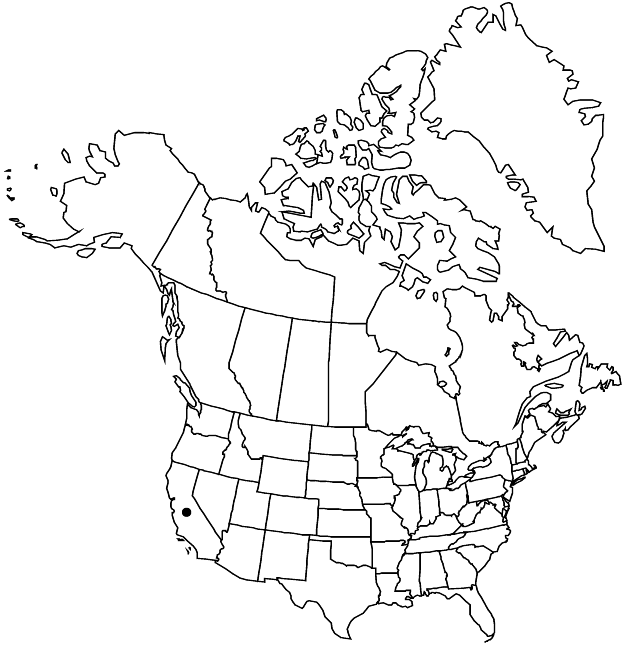Difference between revisions of "Eriogonum eremicola"
Leafl. W. Bot. 10: 174. 1965.
FNA>Volume Importer |
imported>Volume Importer |
||
| (5 intermediate revisions by one other user not shown) | |||
| Line 8: | Line 8: | ||
}} | }} | ||
|common_names=Telescope Peak wild buckwheat | |common_names=Telescope Peak wild buckwheat | ||
| + | |special_status={{Treatment/ID/Special_status | ||
| + | |code=E | ||
| + | |label=Endemic | ||
| + | }}{{Treatment/ID/Special_status | ||
| + | |code=C | ||
| + | |label=Conservation concern | ||
| + | }} | ||
|basionyms= | |basionyms= | ||
|synonyms= | |synonyms= | ||
| Line 25: | Line 32: | ||
|distribution=Calif. | |distribution=Calif. | ||
|discussion=<p>Of conservation concern.</p><!-- | |discussion=<p>Of conservation concern.</p><!-- | ||
| − | --><p>Eriogonum eremicola is rare to infrequent, known only from the New York Butte area of the Inyo Mountains and the Telescope Peak area of the Panamint Range in Inyo County. The Bureau of Land Management considers it a “sensitive” species, and it is well protected in Death Valley National Park.</p> | + | --><p><i>Eriogonum eremicola</i> is rare to infrequent, known only from the New York Butte area of the Inyo Mountains and the Telescope Peak area of the Panamint Range in Inyo County. The Bureau of Land Management considers it a “sensitive” species, and it is well protected in Death Valley National Park.</p> |
|tables= | |tables= | ||
|references= | |references= | ||
| Line 34: | Line 41: | ||
-->{{#Taxon: | -->{{#Taxon: | ||
name=Eriogonum eremicola | name=Eriogonum eremicola | ||
| − | |||
|authority=J. T. Howell & Reveal | |authority=J. T. Howell & Reveal | ||
|rank=species | |rank=species | ||
| Line 48: | Line 54: | ||
|publication title=Leafl. W. Bot. | |publication title=Leafl. W. Bot. | ||
|publication year=1965 | |publication year=1965 | ||
| − | |special status= | + | |special status=Endemic;Conservation concern |
| − | |source xml=https:// | + | |source xml=https://bitbucket.org/aafc-mbb/fna-data-curation/src/2e0870ddd59836b60bcf96646a41e87ea5a5943a/coarse_grained_fna_xml/V5/V5_824.xml |
|subfamily=Polygonaceae subfam. Eriogonoideae | |subfamily=Polygonaceae subfam. Eriogonoideae | ||
|genus=Eriogonum | |genus=Eriogonum | ||
Latest revision as of 22:14, 5 November 2020
Herbs, spreading, annual, 0.8–2.5 dm, glandular, greenish to reddish. Stems: caudex absent; aerial flowering stems erect, solid, not fistulose, 0.3–1 dm, glandular. Leaves basal; petiole 1–3 cm, floccose; leaf blade rounded, 1–2.5 × 1–2.5 cm, densely white-tomentose abaxially, floccose or glabrous and greenish adaxially, margins plane. Inflorescences cymose, open to somewhat diffuse, 5–20 × 5–20 cm; branches glandular; bracts 3, scalelike, 1–2 × 0.5–1.5 mm. Peduncles absent or deflexed, straight, slender, (0.1–)0.5–1 cm, glandular. Involucres turbinate-campanulate, 1.8–2 × 1–1.5 mm, glandular; teeth 5, erect, 0.5–0.8 mm. Flowers 2–2.5 mm; perianth white with red midribs, becoming red, glabrous; tepals monomorphic, oblong-ovate; stamens exserted, 2–2.5 mm; filaments glabrous. Achenes brown, 3-gonous, 2–2.5 mm, glabrous.
Phenology: Flowering Jun–Sep.
Habitat: Sandy to gravelly slopes, sagebrush and mountain mahogany communities, montane conifer woodlands
Elevation: 220-3100 m
Discussion
Of conservation concern.
Eriogonum eremicola is rare to infrequent, known only from the New York Butte area of the Inyo Mountains and the Telescope Peak area of the Panamint Range in Inyo County. The Bureau of Land Management considers it a “sensitive” species, and it is well protected in Death Valley National Park.
Selected References
None.
